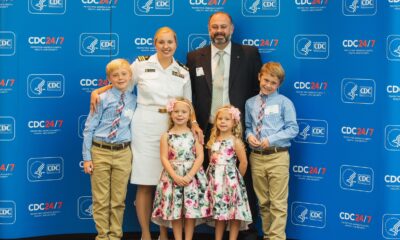Education
Shana V. White in the Runoff for Gwinnett County School Board District 3
Published
11 months agoon
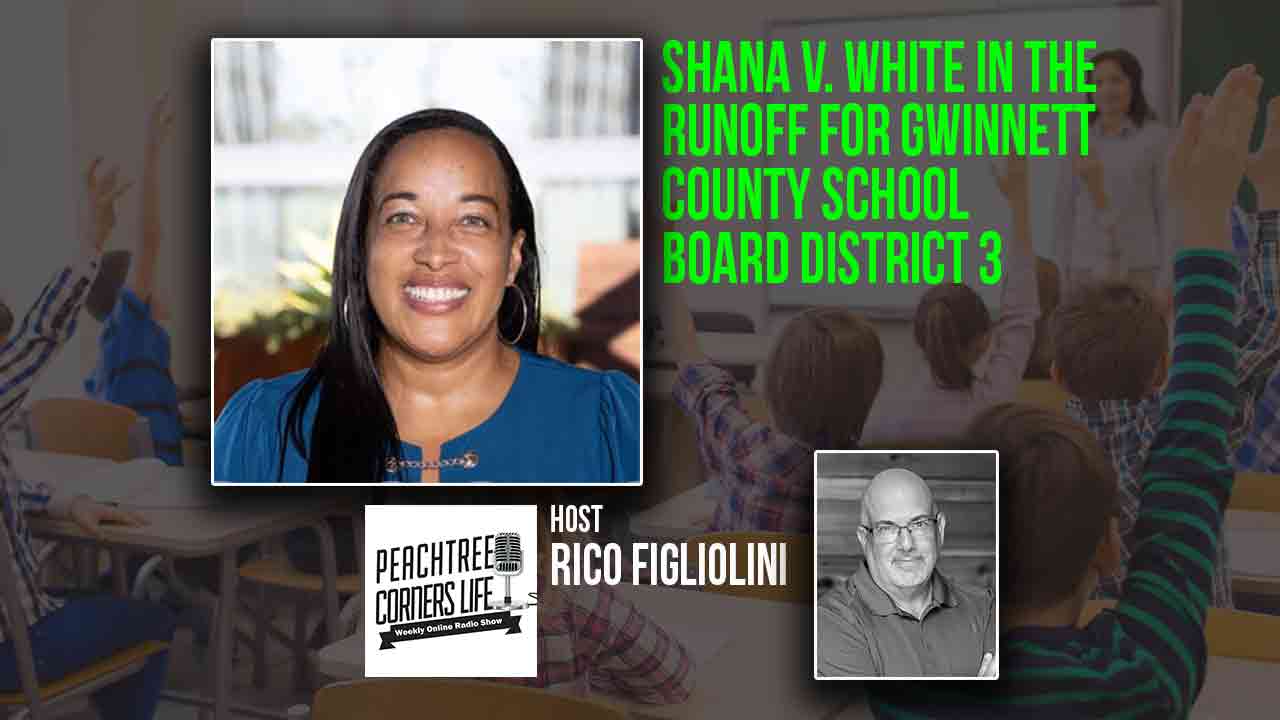
Gwinnett County School Run-off is June 18
This episode features Shana V. White, a candidate for the Gwinnett County School Board. Shana shares her background as a third-generation teacher and her passion for education, highlighting her diverse teaching experience across Metro Atlanta. The discussion emphasizes the importance of a community-based approach to education, with schools, parents, and the broader community working together.
Plus, topics such as school safety, the synergy between education and compassion, and the role of AI in the educational landscape. Don’t miss this insightful discussion on why your vote matters. With your host Rico Figliolini.
Shana’s Website: https://www.shanavwhiteforgcps.com
Timestamp:
00:00:00 – Shana White’s Run for Gwinnett School Board
00:01:39 – Teaching: A Family Legacy and Calling
00:03:19 – From Doubts to Passion: Shana’s Journey as a Teacher
00:04:29 – From Basketball Player to Coach
00:05:54 – Strengthening Schools as Community Hubs
00:09:37 – Rethinking Discipline: Teaching Accountability and Respect
00:13:23 – Importance of Consistency in School Behavior Expectations
00:16:21 – Balancing Cell Phone Use in the Classroom
00:20:50 – Transparency in District Leadership and Decision-Making
00:24:16 – Improving Accountability, Morale, and Equity in Gwinnett County Schools
00:27:57 – Bridging the Gap: Integrating Apprenticeships and AI in Education
00:31:50 – Leveraging Tech Resources to Empower Youth Entrepreneurship
00:36:30 – Importance of Critical Thinking in Early Education
Podcast Transcript
Rico Figliolini 0:00:29
Hi, everyone. This is Rico Figliolini host of Peachtree Corners Life here in the city of Peachtree Corners, Gwinnett county. And we have a good guest here, a great guest today, actually, one of two people running for Gwinnett county school board and a runoff that ends June 18. Shana White, candidate for Gwinnett County School board. Hey, Shana, how are you?
Shana White 0:00:50
Hey, how are you doing? Thank you so much for having me on. I’m excited to be here and to chat.
Rico Figliolini 0:00:54
No, it’s always good to talk about issues and things in Gwinnett county, especially things affecting, particularly Peachtree Corners, if you will. So we’re talking district three, the former seat of Mary Kay. Murphy, who’s, who was in the seat over 30 years almost, I think three decades has done a great job, I think, for this city and for the students here. And now it’s opened. And there were, I believe, five candidates that ran for that seat. You’re one of two. They made it into the final runoff.
Shana White 0:01:27
Yes. I’ve really, really thrilled, like you said, Mary Kay Murphy, I always consider her institution in itself, just with the longevity that she’s had in the position. But I was thrilled and blessed to be able to make the runoff and excited these next three weeks to gear up against my opponent, Steve Gasper.
Rico Figliolini 0:01:49
Yeah, it’s going to be tough. Run offs tend to draw a lot less of a crowd.
Shana White 0:01:55
Yeah.
Rico Figliolini 0:01:55
So it’s really about door to door campaigning and this type of stuff. So tell us a little bit about yourself, Shana. I know. I know you’re an educator. We’ve been a teacher for over 15 years, ten of them in Gwinnett county. But tell us why. Why teaching? I know that’s not always for today’s generation. That’s not always the first choice, but yeah. So tell me why, why you became a teacher and give me some background on yourself.
Shana White 0:02:20
Awesome. So I was born and raised in Atlanta. I grew up in Decatur. I went to Dunwoody High School. So I’m a product of Dekalb county schools back in the day. I still talk to my high school principal, Doctor Jenny Springer. She actually lives in Gwinnett now. She did an endorsement video for me, but I think from early in birth, I think that teachers are kind of born. It’s an innate ability. I’m a third generation teacher, so my mom was a teacher in DeKalb county, and then my grandmother was a teacher in segregated schools in New Orleans. So I think that I was kind of born to teach. I always fought it when I was a kid. I actually wanted to be a physical therapist when I went to college. I went to college at Wake Forest and my professors. The beauty of Wake Forest, besides it being an awesome school, is that it’s very small. So you get to know your professors very, very well, and my professors got to know me, and they’re just like, you just have the personality of, like, a coach or a teacher. I don’t think that you’ll do well because you’re a very empathetic person with physical therapy, because you have to put people through pain and you’re going to empathize too much, and it’s going to be hard for you to do your job well. But something where you’re working alongside people in a different capacity, where you’re helping them be successful, would be better for you. And so they encouraged me to coach at a local high school up in Winston Salem, North Carolina. And I got the bug to be like, oh, maybe I am supposed to be a teacher. I’ve been doubting this my whole career. Told my mom I’d never be a teacher like her, and here I am. As I said, I’ve been a teacher. I was a teacher for 15 years in all over metro Atlanta. I’ve taught in public and private school, also taught at Wesleyan, over in the Peachtree Corners area for a year and coached there. But most of my time I spent teaching in Gwinnett county schools. I taught at Peachtree Ridge, and I was the basketball coach there. I also taught at summer hour. I taught at Sweetwater, and I spent a bulk of my time at Creekland.
Rico Figliolini 0:04:22
Any particular subject areas that. That you taught there?
Shana White 0:04:26
Yeah. Everybody gets kind of, like, geeked out and excited at the same time. I’m one of, I think, two people that certified in the state of Georgia in health and PE, in computer science. So I self taught myself computer science. I spent most of my career teaching health and PE, but I taught computer science towards the end of my teaching time when I was in Gwinnett.
Rico Figliolini 0:04:49
Great. We’ll get a little bit towards computer science and all that in a little while.
Shana White 0:04:54
All right, awesome.
Rico Figliolini 0:04:55
But I do want to. So you. You coached basketball, you said, right? Any other sports, or is that the sport that you coach?
Shana White 0:05:02
That is. That is the sport. I played three in high school. I played soccer, basketball and softball. I was better at basketball. AAU was kind of like the beginnings of what it is now. Now it’s a complete, like, money making scheme. But AAU started shortly. When I was playing, I was really good at basketball. I was really good at soccer. I spent more time with basketball. I was a selected or invited walk on at Wake Forest. So I had scholarship offers to a lot of other schools, but I wanted to go to wake academically. I narrowed it down to Wake and Emory, and I just did not want to stay home because I was from Atlanta. I wanted to be somewhere else. And so I went to Wake as an invited walk on for the basketball team there. And I coach soccer a little bit like middle school, like rec, but basketball is the thing that I coached at the varsity level for an extended period of time.
Rico Figliolini 0:05:58
Gotcha. Probably should have asked you this before. Do you have any kids?
Shana White 0:06:02
Yes, I do. I have a daughter who just finished her freshman year at Paul Duke, and then I have a son who just finished his 6th grade year at Coleman.
Rico Figliolini 0:06:12
Wow. Okay, cool. So, students here, teacher, Gwinnett county, I’m sure through what you’re doing, through having been to varied schools, private and public, and through coaching and through subject teaching and being in Gwinnett county schools for ten years, I’m sure you’ve observed all sorts of things going on in your mind at this moment. What are the challenges facing Gwinnett county? In Gwinnett county schools, their students and their parents and teachers?
Shana White 0:06:43
I think the big thing is making sure that schools become back the heart of the community. I think the way society has kind of grown is that we’ve grown away from the fact that when we have strong schools, we have strong communities. So our cities are only as good as how strong our schools are. And I think drawing both parents and kids into a full learning experience, not just this rote memorization of, we have to get certain scores on standardized tests, reading, writing, math, they’re all very, very important. But we want kids to feel like they belong at the school, and the parents feel that their kids are safe at the school. So making those schools those kind of full on community places where kids want to be on a daily basis, where they’re not going to want to get in trouble. Like I said, I’ve dealt with many kids, kids that sometimes don’t choose the correct behaviors. But we want our schools to be a place where they can make those mistakes and not necessarily make them in a damaging way, but make them, but understand that when they do make those mistakes, there’s accountability for that, that you cannot make decisions that are going to hamper my ability to learn, my classmates ability to learn the safety of my building, the safety of my teachers, the safety of my administrators. So just having kids better understand and feel ownership at their school, that they want to be there, that they’re part of a bigger community, and that their role in that is to make that community thrive by them being a successful student and then also drawing parents in. I know that a lot of parents are taxed as far as maybe work, other family obligations, those types of things, but helping them understand that, like, the school is not necessarily taking their job, but there to support them in raising kids, that it’s a community type thing. And it’s not just one aspect, the school doing one thing or just the parents doing one thing, but working in cohesion. Because we all want what’s best for kids. And when we have kids that are thriving, our communities ultimately are going to thrive.
Rico Figliolini 0:08:42
I believe parents all want that. Right. And you’re right when you say that, you know, there’s challenges and time is being competed for in a variety of ways. And you may have, especially in this county, right, where we’re such a majority minority county, so you have a lot of non english speaking parents. Maybe both parents are working well nowadays, almost both parents are working no matter where they are in the economic scale. But, you know, it’s challenging. If you’re getting paid per hour, if you’re doing gig work or stuff like that, it’s certainly challenging. I think we all want respectability. You know, we want kids to be respectful and to understand and take responsibility. Are there specific programs or ideas that you have that you would like to see implemented that may not be there right now? Things have changed. Right. Two years ago, was it two years ago where they changed that punishment? I shouldn’t say punishment.
Shana White 0:09:39
It’s not really the discipline policy.
Rico Figliolini 0:09:41
Correct. That was changed at one point. Things happened really bad because of it, or in spite of it or whatever, and now things have moved back again. So, you know, things are done for a good reason sometimes, but even. Even for good reasons, they end up having to be changed because bad outcomes. So what do you see as something you’d like to see done?
Shana White 0:10:03
Yeah, I think a lot of times I always tell people discipline comes from the latin word, which means to teach, not punish. And we have to get in that mindset to understand that we want to teach kid what is respectable behavior. And I think having that sense of ownership of being a part of a school community, that I wouldn’t want to make this environment unsafe for me to learn in or for other people to learn in. I think the discipline policy needs to be revamped. I believe in restorative justice when it’s implemented correctly, but when it’s implemented the way that it was in Gwinnett, you get the results that happened in Gwinnett where it was not implemented thoroughly. Teachers were unsure of what their lines were, what their responsibilities were, administration, etcetera. And so when you have a policy and you don’t have the people in place to implement it and they’re not told what to do, then you get kind of a chaotic result with things. I think understanding that students need to understand that they have to have accountability for their actions is really, really important. And understanding that teachers should have a little bit of power because they are the ones that are in the classrooms with students, more often than not, to basically hold these students accountable, that it’s not something where they can’t hold students accountable for behaviors in their classroom that are not acceptable and that students are required to actually not necessarily always be punished, but they are being held accountable for their actions. So if their actions are disruptive to the learning environment, nobody can learn. So we have to make sure that that student is necessarily removed from the environment so that everybody can be successful and so that student can also be taught what behaviors are acceptable in the classroom and what we are going to allow so that everybody can have a conducive learning environment. So I believe the accountability is the big piece. And I’ll be perfectly honest, as a former teacher, a lot of times accountability is very, very hard, and people think of it as this bad word. But accountability breeds that respect that you mentioned before, because when you hold people accountable, they’re going to be respectful. And I think also having the ability to hold people accountable is something that is not necessarily given very freely as much as it should be. And some of that onus is on our families. Some of that onus is on students. Like you said, society is a lot different than when we were growing up. But at the same time, kids understand consistency and they understand accountability when it’s taught. I know in my classroom I never had discipline issues because the kids knew this is how we expect everybody to act in this classroom. This is what we’re going to do. And then these are the examples of the accountability measures that we’re going to take.
Rico Figliolini 0:12:44
No, I was going to say so. I mean, you know, kids are in high school. It’s one thing if they’re already 16, 17 years old. It’s very difficult to change behavior at a certain point. You know, we’re not talking, you know, hey, even that word of changing behavior. But if they’re being disruptive, obviously there has to be, like you said, you know, there has to be outcomes to that, right? Responsibility has to be taken. Does it make sense to change things the way they could be? Almost not revolutionary, but just look at the first four grades of school, of kids coming up through that, because they’re all coming up through the same thing usually. I mean, it’s not transient as much as they’ll be going through 12th grades, probably, in Gwinnett county, unless they move out of the county. Does it make sense to look at the first four or five grades and say, you know what? We’re going to do this different. We’re going to begin that process more endearing at those younger grades? Does that make sense?
Shana White 0:13:43
Yes, it does. And I think that that gives the onus to elementary schools to be kind of the molders of our students that are going to be coming through Gwinnett county schools. And if there is consistency, and that’s kind of where we are as Gwinnett, because we are site managed, every school’s principal is going to make individual decisions that meet the best needs of their students. But I feel like overarching across the entire county, there needs to be a consistency, especially in the elementary level, to say, these are the behaviors that we expect our students to exhibit in Gwinnett county schools, kindergarten, all the way up to 12th grade. And so they are consistently getting those things reinforced with them at early ages. So it’s not a huge culture shock when they get to get high school, and all of a sudden they’re like, wait, I was allowed to do this in fifth grade. I was allowed to do this in middle school. Now I’m not allowed to do this in high school. Whereas if that consistency is very, very key, I think that’s the one thing that we’ve lost in, Gwinnett, is we have a bit of inconsistency with how we enforce things with students. And I think when you bring consistency, kids are less confused and they’re less apt to act out when they know that things will be consistently enforced and they’ll be consistently held accountable to certain standards.
Rico Figliolini 0:14:56
Do you think social media or use of cell phones in schools contributes sometimes or exasperates bad behavior. Do you think that’s something that the school system should address?
Shana White 0:15:09
Yeah, I think phones, I think adults were just as guilty. I can’t deny the fact that I have my phone in my hand on a regular basis. And so we have to understand that our modeling of behaviors are not necessarily great for kids as well. I do think social media, especially in now, this day and age, has the implications of being harmful for kids. You see a lot of bullying, you see a lot of social media harassment that happens, those types of things. And so kids need to be better equipped to handle this powerful tool that they have in their hands to understand their implications of using these devices and understand this stuff follows you, that that digital footprint that you make in the 9th grade is going to follow you when you’re applying for college as a 12th grader or applying to just go into the workforce. So, again, going back to that consistency and letting kids know that nothing is hidden on social media, you might think that a snap picture goes away after a minute. Those types of things, everything can be found because it’s all just data. But I do think cell phones in the classroom can be a distraction. I think that they’ve gotten worse just from when I was in the classroom to now, because I think almost everybody has a cell phone. I had kids when I was even at Wesleyan that were like, in third grade, and I was like, who are you calling in third grade? What do you need a cell phone for? Type of thing. But I know that it’s a parent choice, and so you have to respect that. But finding ways to either have students, one of the things that I did in my classroom, which helped mitigate the cell phone issue, was I would have a mindfulness moment to start every class. And luckily, I was a connections teacher, so I had the students for 90 minutes because we were on block. And so I would let kids spend the first ten minutes of class doing whatever they needed to get focused on my class. So some of them chose to listen to music on their phone or text. But I said, outside of this ten minutes that I give you at the beginning of the class, the cell phones are not out the rest of the time. And I never had issues with cell phones with that because I kind of gave into that kind of addiction that a lot of people have to just be on their phone. Hey, I’m giving you ten minutes. Outside of the ten minutes is my time for us to learn in this classroom. But I do think cell phones can be a distraction in the classroom, and I think that they’ve got to be handled in so many different ways because students are reacting differently, like in how you handle it in middle school and high school. So it look different as well.
Rico Figliolini 0:17:44
For sure. And everyone want. Everyone wants an audience, I guess. And they’re all looking for views and they’re all looking for. I mean, we all. I work in the business as well, in marketing, so I get it. And it’s not an easy. It’s not an easy thing. And it’s hard to put it down. Right. You scrolling for 20 minutes, 30 minutes, and you’re realizing you’re already. God, it’s already an hour later now.
Shana White 0:18:07
Yes.
Rico Figliolini 0:18:07
And you’ve accomplished nothing.
Shana White 0:18:09
That’s exactly.
Rico Figliolini 0:18:10
So it could be crazy.
Shana White 0:18:12
It’s a nice time waster.
Rico Figliolini 0:18:13
Yes. Yes. That’s for sure. And God knows who wants to see someone, you know, like, whatever they’re doing. I mean, it’s just like. Although I find great recipes, I gotta say. But other than that.
Shana White 0:18:25
Yeah, I was gonna say I find great recipes on TikTok. That’s one of the reasons I’m on there. And we just got a puppy in our house and so lots of dog content so that we’re raising our puppy correctly because we’ve never had a pet before. That’s what I’m glad the algorithm has gotten. Just cooking and puppies on mine so I don’t see all that other wild stuff.
Rico Figliolini 0:18:44
Yeah, yeah, I was going to say. So also, I think part of what you talk about is transparency, right? One of the three main things, integrity, compassion, which pretty much we’ve gone through. But transparency, what do you mean by transparency and where do you expect that to be? How will that be helpful?
Shana White 0:19:04
Yeah, I think the big thing, even when I worked in the county and to now, is that the county is very top heavy and there’s not real clarity as far as what is happening at the top of the hierarchy in the county and how that is impacting schools. So I’ve mentioned this before in many events, like the chamber forum, all that stuff is that we’ve never really had an equity audit in Gwinnett. And the equity audit, I don’t want people to get scared by hearing the word equity, but it basically gives you an understanding of where the county stands and where the gaps are as far as needs for students and teachers with resources, with funding all these things in place. And so we’ve never had an equity audit. We have LSPI, which is a local school plan for improvement, but that’s not an equity audit. And so there’s a lot of data that we see from the county that I would say is not 100% painting a real picture. It’s painting a picture that they want people to see, like staff retention rates. I know Doctor Simmons, who’s on the board right now, posted something that she received from the county about the number of teachers that we’ve lost. And we know that teacher retention rates are actually really, really bad for Gwinnett and lower than certain areas in the state. But the data that came from the county made it and painted a picture that we had no teachers or very few teachers leaving. And so what I mean by transparency is just the transparency with the data is you can’t fix problems if you don’t really clearly know what those problems are. And so, as much as it’s allowed ethically, because I know school boards have certain tenants where they can’t breach as far as certain areas of information, but the information that should be readily available to all constituents in the county, because even people who don’t have kids in Gwinnett county schools understand Gwinnett county schools drives your property value. So if you don’t know how the schools are standing as far as certain issues, then you don’t have clarity as far as what direction Gwinnett county schools are going. And so I think the transparency, for me is just transparency in what are the goals of our leaders, the superintendent, district leadership, et cetera. What direction are you trying to take us, and what does the data say so that we can make the best decision that’s going to serve all students? Because in order for Gwinnett to be world class, it can’t just be certain schools. It’s got to be the whole district. And as you mentioned before, the district is predominantly Latin A and black right now. And so how are we making sure that we serve those schools just as well as we’re serving the schools that maybe don’t have that pronounced racial demographic added so that all schools can be good? Because you can have five schools in Gwinnett be good, but since there’s 142, those five can’t make up for the ones that are maybe not as strong as they could be, for sure.
Rico Figliolini 0:21:57
And we were talking. You’re talking transparency. So what’s peculiar to me, to some degree is that every member of the board should have access to all that data. No, they should.
Shana White 0:22:09
But they. I know numerous times, just even asking, talking to some of the Gwinnett teachers, talking to current board members, they ask for the data, and it’s not given to them or it takes months, those types of things.
Rico Figliolini 0:22:24
Freedom of information and stuff.
Shana White 0:22:26
Yes, the Freedom Free of Information act. Exactly. So it’s one of those things where it’s. They’re giving what they want to give. And the big thing for me, I think, for transparency that breeds accountability, is that when everybody has a clear picture of what everything is going on behind the scenes, and I know there’s some things that have to still stay behind the scenes, just ethically, between the school board and the superintendent. But some of these things should be clear so that everybody knows where things stand, because it is easier to hold people accountable. Because if we don’t set goals off clear transparency, then we’re just aimlessly going in any kind of direction and not going to lead to kind of this ideal of being world class, as Gwinnett has been the motto for. With doctor will bank or mister will banks in previous years.
Rico Figliolini 0:23:14
Yeah, I can appreciate the. It’s not the secrecy, but the behind the scenes stuff like you’re talking about where, you know, if they’re choosing certain properties that they have to bid on, those things make sense because those prices can. Can hike up. And I know people are worried about, well, who chooses those properties? Well, that’s what the board’s there for. If we believe in who we voted for, they should be the custodian of. Of good practice there. Right. And I can understand the discussion between the superintendent and the board needs to be in private because sometimes, you know, there’s discussions and you should not be afraid to be able to give your opinions that it’s going to get out because, you know, you’re arriving at a decision at some point. If you can’t give your honest opinion because someone’s going to talk you down and say, well, why are you saying that? You know, it doesn’t lead to open. It’s like shutting a kid down before they get to say who, you know, how they feel. So honest discussions sometimes have to be kept in private. So I appreciate what you’re saying with that, but with budgets being spent, you know, stuff that have already been voted on and knowing where the money is going, that should be all open. I mean, Kemp, Governor Kemp, just, what was it? $45,000 per school for security for each school to decide how they’re going to use it, apparently. I think, you know, some. Everyone’s going to want to know how that’s based and what each school is going to be using it for. And then the teacher raises, and I can appreciate there’s a budget for teachers. Right. But maybe there’s 30 empty slots because no one’s being hired. That money’s sitting there. Right. So there’s so much going on in a big. In a big county like this. You know, your term, I think, would be, is it two years or is it four? Four. So it gives you enough time as a candidate, if you win, to be able to go in there. So in your first year, then what are the two important things that you’d want to make sure gets done in your mind?
Shana White 0:25:25
Yeah, I think the first thing, and I’ve mentioned this before, is just the accountability of the superintendent. Right now, I don’t feel he’s being held accountable to a standard that needs to be for what we expect for Gwinnett county schools. People have mentioned before certain data points like our graduation rates going down, all those types of things that we see metric wise with student achievement. But ultimately, all of that falls on the operations. And the person who the buck stops with the operations is the superintendent. And so for me, the one thing is I would love to see, hopefully, behind that black curtain, all of this real data that maybe can’t publicly be out there and sit there and look at, did he meet the goals that he was supposed to for what he was hired to do? And I feel like those are yes or no questions. I don’t feel like they’re a maybe or an iffy. They’re just kind of like, we look at the data and then we sit there and say, did he do this? Did he do this? Did he do this? Or did he not do this? So I’d say the superintendent is the first thing and kind of clearing up, because I feel like there’s. I don’t say confusion, but there, within that hierarchy, there’s been a lot of turnover. And with that, you lose some of the camaraderie of the staff. You lose some of the, like, belief of the staff in the system being successful for them. And so finding a way to rebuild staff morale as well is a big thing for me. As a former teacher, I know what it’s like to be in a Gwinnett county classroom, and I know how hard that job is. And finding ways to build staff morale back up would be another big thing, because I hate that we keep losing really great teachers. I know a lot of teachers nationwide are just leaving education as it is because for some of us, it’s not sustainable, sustainable, but ultimately building staff morale back up. And then I would say the last big thing is some sort of audit where we’re looking at, what are we doing at every one of the schools in Gwinnett county? And how can we make sure that every gap is filled so that every school has what they need to be successful?
Rico Figliolini 0:27:31
When we talk about schools like Paul Duke, for example, or even Gwinnett was a science, math, the specialty schools, if you will, to integrate. Although Paul Duke is named a STEM school, it’s also a hybrid educational school, right? Because some kids that normally would not, let’s say, be looking at STEM is being taught in an alternative manner that best suits them. That’s what that school essentially does. There’s technology that’s out there, right? We talked just a touch before about AI, before the podcast. AI is being used consistently now throughout a variety of companies out there. Probably every company out there is using AI to some sort of degree, whether it’s writing a copy for a website for a small company, or it’s creating bots, or it’s, you know, to do certain finite tasks. How does the school system, how do you feel the school system can address, first kids that don’t want to go to higher level education? That’s probably even a misnomer, really, to do more advanced education. And they would prefer leaving high school knowing that they can do something, whether it’s cad programming or 3d printing or welding. I mean, we don’t even have that type of stuff in the Gwinnett county schools. I hate to say this, but when I grew up, yes, printing, print shops, metal shops, all that, right? So a lot of my friends from high school would go on to auto mechanics schools and stuff. I see that happening now. I see kids being. Don’t want to go do other things they want to do. That AI coming into the mix over the next five years now may change a lot of those jobs. Will change a lot of those jobs, especially manufacturing and warehousing and all sorts of things like that. Where do you find, what do you think needs to be done for kids that want to leave high school and go straight to work? And part two, I guess, because AI is really part of that. Right? And how AI can be used in schools.
Shana White 0:29:45
Absolutely. I’m a big, big proponent of any part of the organization that I work with now. We work with apprenticeships for students, so we pick that gap between 16 and 24 for the kids who don’t want to go to college, but they do want to maybe pursue something in computing, computer science, AI, those types of things, with setting them up with organizations. And I think that that should be kind of a through line without all Gwinnett county high schools, not just the specialty schools, the Paul Dukes, the math and science school. I know Schessinger is an AI school, but basically allowing just kind of this apprenticeship internship model. I know we have work based learning already in schools. I know for some kids who do want to maybe start the higher ed thing, there’s the dual enrollment piece as well. But I think some sort of apprenticeship program for those students who maybe want to go into welding, who want to be an electrician, carpenter, those types of things, and connect them with people in Gwinnett county, because we have so many businesses that are doing some of the things that our kids are interested in, how can we develop some sort of apprenticeship program for them so that they can be an apprentice during the summer or during the school year and not necessarily get like a full salary as a work based learning type of thing, but it be a work based learning environment where they’re still getting a stipend to learn something as a skill that they want to pursue post high school. I think that that’s really, really important that we build.
Rico Figliolini 0:31:18
Okay. Do you think. Do you think that school system should not. Should be working holistically? Maybe. Maybe with the chamber of commerce, maybe with other, you know, I mean, integrating all that versus trying to be siloed.
Shana White 0:31:33
And trying to come up with. I totally. I totally believe that we should be thinking of everything as a big picture, rather than just, you take chemistry, you take physics, you like this pattern that we go. And all that standardization comes because of standardized tests. That’s why everybody has to go through the exact same system, because everybody’s got to take certain benchmark tests in certain grades. But I think thinking of it holistically, I know the curiosity lab that’s down in Peachtree Corners is another place that I feel is underutilized by Gwinnett county to connect, empower up kids to be able to go and work with tech individuals, maybe tech entrepreneurs, to figure out, maybe I’m an entrepreneur, and that’s something I want to pursue rather than higher ed. I think that that definitely is an untapped area. And I think looking at kids holistically and not literally putting them in boxes as we do right now, education is really important. And for the answer to the AI piece, AI is everywhere. I tell people all the time in my work, AI has been around since the sixties, so don’t let people tell you that it hasn’t been. It’s been around for a really long time. But I know that it’s full of the buzz right now, and AI is changing a lot of things. But the really big thing that I want to impress upon with people is understanding not only how AI works, but how AI utilizes everybody’s data to make it go. Because AI, if it doesn’t have data, it doesn’t go. And so it’s getting data from somewhere. In most cases, it’s screwed, scraping the web to get the data, but understanding that we have the power to withhold our personal data, our communities data to keep that safe from this AI machine. And I think that’s really, really important. AI is of course going to transform education. I think we need to pump the brakes a little bit on that in the sense of making sure kids understand the ethical implications of AI when we’re talking about it. But at the same time, I do think AI is an important part of education because I work still in computer science education, which I feel is essential for all students to have some sort of digital understanding of this technology world and be able to navigate it, because there’s no, no career that you’re going to have to do that. You’re not going to use a computer. And so kids understand that, not just being able to type on, you know, your keyboard for your phone, but some kids don’t even know how to type on a keyboard. Like I remember I had keyboard that doesn’t exist. I watch my own two kids when they’re sitting there typing reports and they’re one finger pegging and I’m sitting there, I’m just like, okay, this is so much easier if you actually learn how to type that type of stuff. But like you mentioned before, the wood shop and like the home Ec, those other types of skills, I wish we would go back to more of a holistic thing to give kids more variety so they can just see that there are certain areas that they might be interested in that are not just pigeonholed into the math, into the science, into the Ela.
Rico Figliolini 0:34:36
Funny, because I talk about my experience, but at an age where I’m talking about like four or five decades back. But my 29 year old tells me, just told me the other day, literally, about pecking keyboards. He’s like, I have these college kids that are coming for internships for the summer, and he says they don’t know how to type. Never mind. They can’t read cursive, which is fine, they teach, which almost doesn’t make sense in the sense that they still want a signature, which is in cursive, I guess, right? These kids can read cursive, they can’t type. They’re doing, he said they’re doing two, maybe four fingers, and it’s just, it bothers him. And he’s 29 years old. He’s not, he’s not like an old guy here, but he went through the IB program, too. So the other thing that he worries about is that he’s looking at writing, and these kids can’t write. We’re talking about college. Third year student, you know, can’t write a cohesive piece of work. And he says, and they have Grammarly on the computer and they still can’t get it together. So it’s a sad state of affairs to some degree. I mean, unless you’re, you know, a higher level student, it seems like more of these students are not coming out unless they go through an IP program of a sort where it’s a bit more rigorous. There’s a lot more writing in that. Well, at least when he went through, I don’t know if it’s changed or not.
Shana White 0:36:01
Yeah, yeah, that, and also a lot of the reading is a big part of it. To be a good writer, you have to want to read.
Rico Figliolini 0:36:10
Right.
Shana White 0:36:11
I would say there’s a lot of adults that don’t read, and even just to read for information, not to just take something for face value and critically think is really important. And so we’re just in this mindset just with education, where we teach to test and just try to prepare kids for tests rather than prepare them to actually be like engaged citizens in the world, to be able to read text, to interpret it, understand it, and then formulate an idea or ask questions. That’s the big thing I always push in my class, and something I still do to this day is I always ask why? What is the intent? What is the motivation, those critical thinking thoughts, rather than just taking something at face value and saying, okay, I’ll just go with this.
Rico Figliolini 0:36:51
Yeah, I agree with what you were saying before, and I think we agreed on, both of us, that the first five grades are the important part, and not only in teaching respect and responsibility, but the other, the other approaches to subjects as a whole. Right. With, with each other. Because really, the grades go into, to me, that doesn’t make sense. I mean, middle school, I can understand the way you want to test at that point. That’s fine because you’re going to high school and you have to be testing against other students across the country. But from elementary school, those five first years just seem to be such an investment that if we had done that or if we do that, it will set the stage for the rest of their life. We’ve come to a point where I think that I think everyone would like to be able to know where they can find out more information from you, Shana. So tell me.
Shana White 0:37:53
Awesome. So my website is shanavwhite4gcps.com. I’m also on Facebook and Instagram as well, @voteshanavwhite and would love to converse with you. A lot of times I’ve learned in this short time running for office I get comments on Facebook and I actually respond. So feel free to reach out. I will respond. I’m not one of those people who just posts and doesn’t pay attention. If you have any questions, feel free to reach out on my website or on Facebook or social media. I’ll be more than happy to answer any questions you might have.
Rico Figliolini 0:38:32
Next one so June 18 is a runoff date and give us a 1 minute thing about asking for that vote.
Shana White 0:38:40
Awesome. Once again, I’m Shana V. White. I’m running for district three school board. I’m the only candidate who has Gwinnett county teaching experience for ten years. I think that educational experience matters. I’m also a national expert on computer science and AI and then a national advocate for public schools. I want to get Gwinnett county back to where it should be, which is an elite level county of public schools where all students are thriving, all teachers are being successfully encouraged in the classroom and want to be there and that where everybody feels safe and included in the classroom. Rebuilding Gwinnett county schools to be those community anchors to make our entire county thrive.
Rico Figliolini 0:39:24
Excellent. Thank you Shana everyone. Check out her website. Leave your comments below. Depending where you’re watching this or if you’re doing listening to a podcast on Spotify or iHeart. Certainly just email us or come to our Facebook page or YouTube channel where this is streaming and make your comments there. Shana, hang in there for a second. But thank you everyone else, I appreciate you joining us. Share this with your friends. Again, the runoff is June 18. There is early voting, so check Shana’s website or with her or the county’s website and you can find out more information about dates and such. But thank you again for being with us.
Related
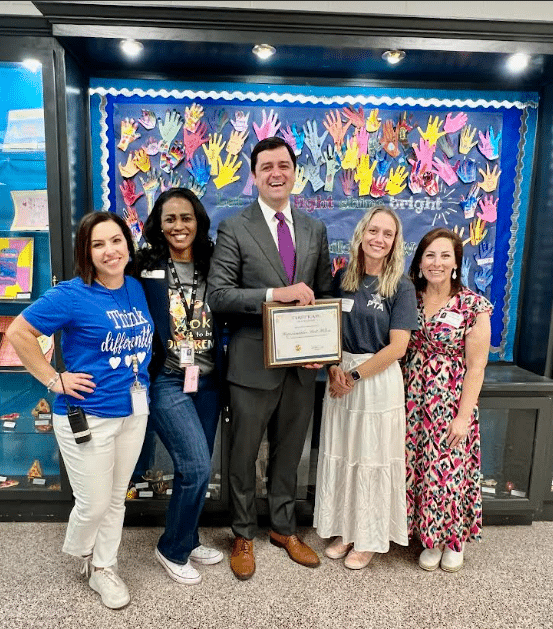
Simpson Elementary School celebrated Exceptional Children’s Week (ECW) last month with five days of special activities to recognize their special needs population and all of their exceptional students.
April 14–18 is set aside each year to celebrate children with disabilities, gifts and talents. This year’s ECW theme was Bridging Gaps and Building Futures, and the school was happy to take part.
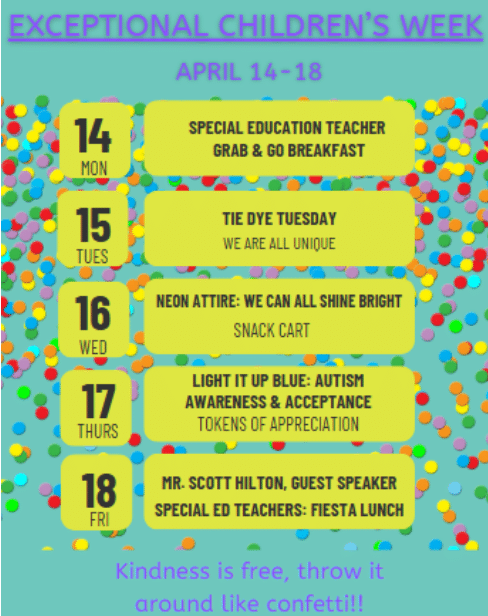
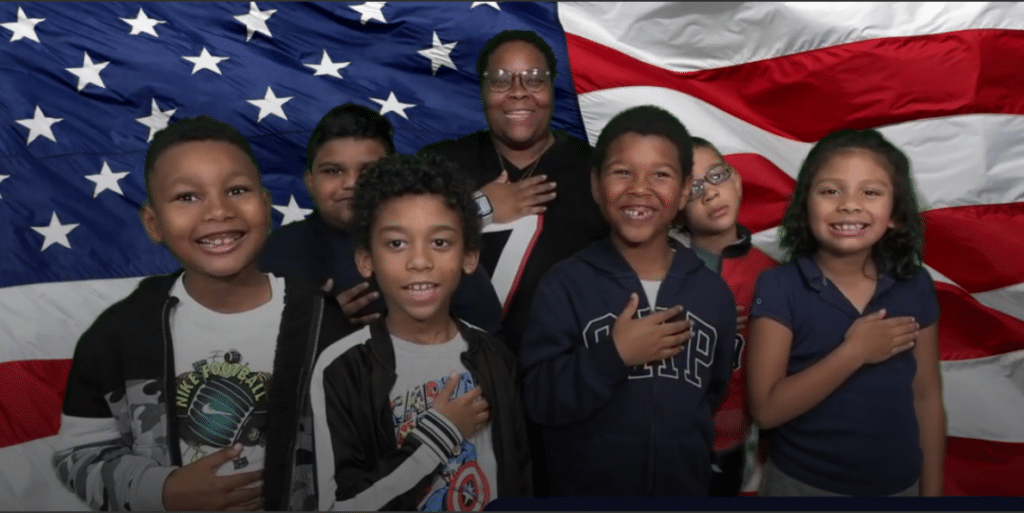
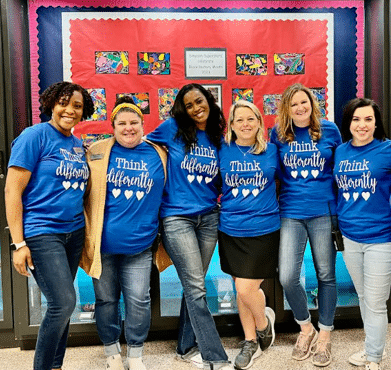
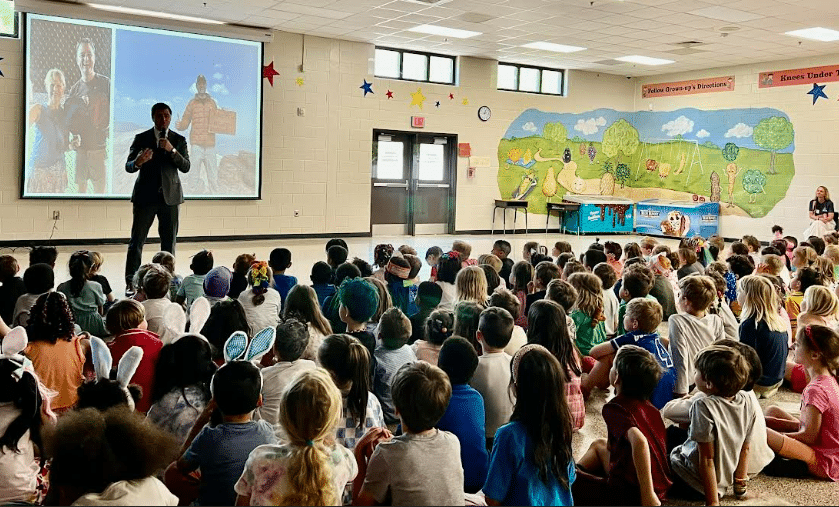
They highlighted each day of the week on the morning news with fun facts about notable people in society — and throughout history — who have overcome challenges with their disabilities, including actor Daniel Radcliffe (who has lived with dyspraxia for his entire life), Tom Cruise, Whoopi Goldberg, Frida Kahlo and Helen Keller.
Simpson Elementary’s technology team also pre-recorded various special needs classes reciting the Pledge of Allegiance every day of the week.
Guest speaker
To end their ECW with a bang, they invited former Simpson Elementary parent, State Representative Scott Hilton, to come in and speak to their K-2 classes about raising his son, Chase (who is autistic and now a student at Norcross High School), and how being different is okay.
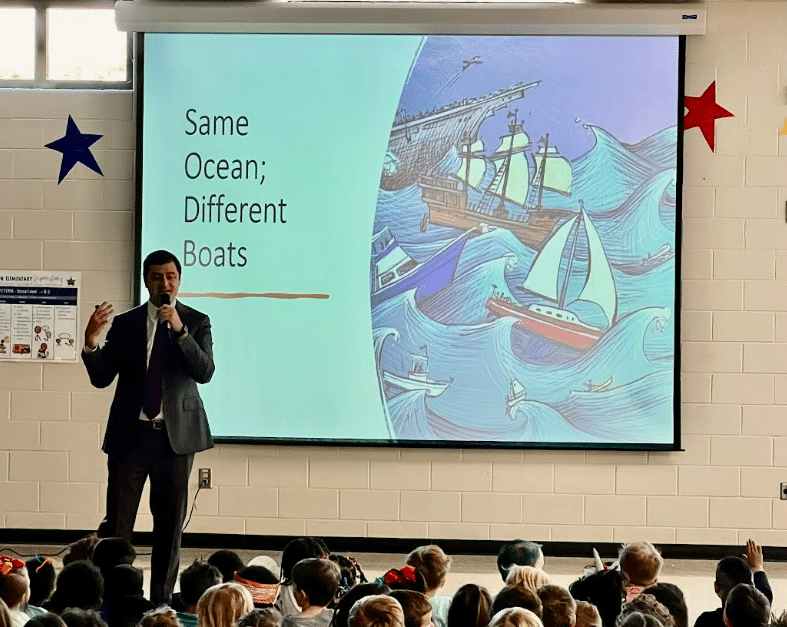
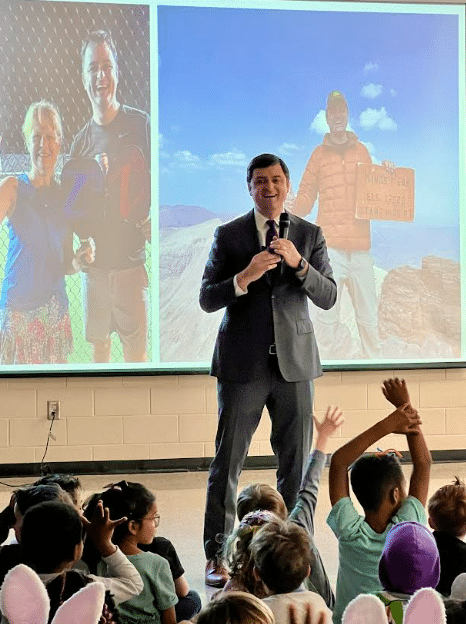
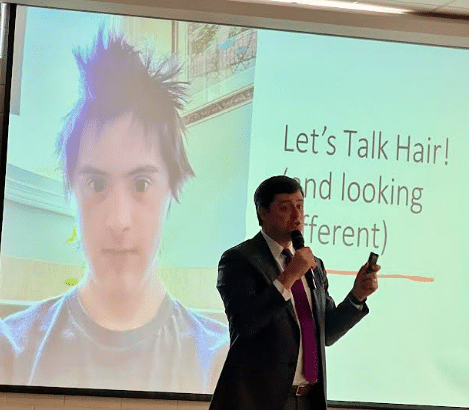
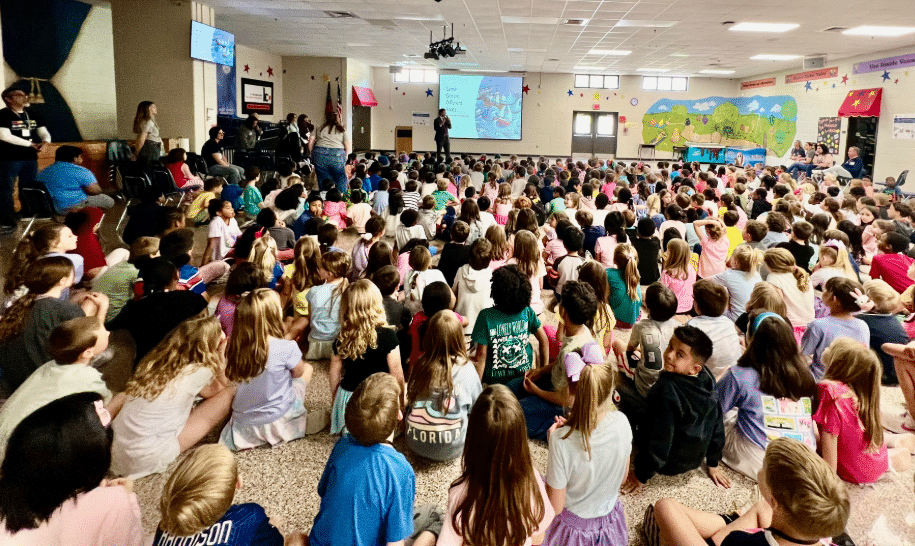
“Showing kindness and being inclusive is the best version of humanity,” said Dr. Taffeta Connery, Simpson Elementary School principal, in a statement about the event.
“Simpson Elementary has a special needs population of 214 (23%) of 946 students. [And] … we strive to ensure that our students are valued, recognized and instilled with high expectations for all.”
For more about Simpson Elementary, visit simpsones.gcpsk12.org.
Related
Education
Paul Duke STEM High School Student Earns CGO Scholarship
Published
7 days agoon
May 2, 2025
Cobb Global Outreach Inc. (CGO Inc.), a non-profit organization dedicated to enhancing financial literacy and educational opportunities, recently awarded three scholarships to metro Atlanta high school seniors, including one to Paul Duke STEM student, Baylor M. Brown.
The scholarship initiative underscores CGO Inc.’s commitment to empowering youth through financial education and support.
According to CGO’s social media pages, these outstanding students have shown incredible dedication and resilience in their academic journeys. “We are proud to support their continued success and look forward to seeing all that they will achieve!”
Scholarship details and impact
The scholarships provided by CGO Inc. are designed to alleviate financial barriers and encourage academic excellence among students pursuing higher education. Each scholarship recipient will receive financial assistance to support their educational endeavors, along with resources to enhance their understanding of financial management and literacy.
The scholarship recipients have demonstrated remarkable potential and a strong commitment to making a positive impact in their local community and beyond.
Bobby Cobb, CEO and founder of Cobb Global Outreach Inc., expressed enthusiasm about the partnership, stating, “We are honored to support the students … . By investing in their education and financial literacy, we aim to equip them with the skills necessary for a successful and financially secure future.”
Looking ahead
Cobb Global Outreach Inc. remains committed to expanding its scholarship programs and financial literacy initiatives. The organization plans to collaborate with additional schools and community partners to further its mission of closing the wealth gap and fostering economic empowerment among youth.
About Cobb Global Outreach Inc.
Founded in January 2021, Cobb Global Outreach Inc. is dedicated to educating middle and high school students about financial literacy. The organization believes that providing students with tools and resources related to financial literacy will help narrow the wealth gap and promote economic empowerment.
For more information, visit cobbglobaloutreachinc.com.
Related
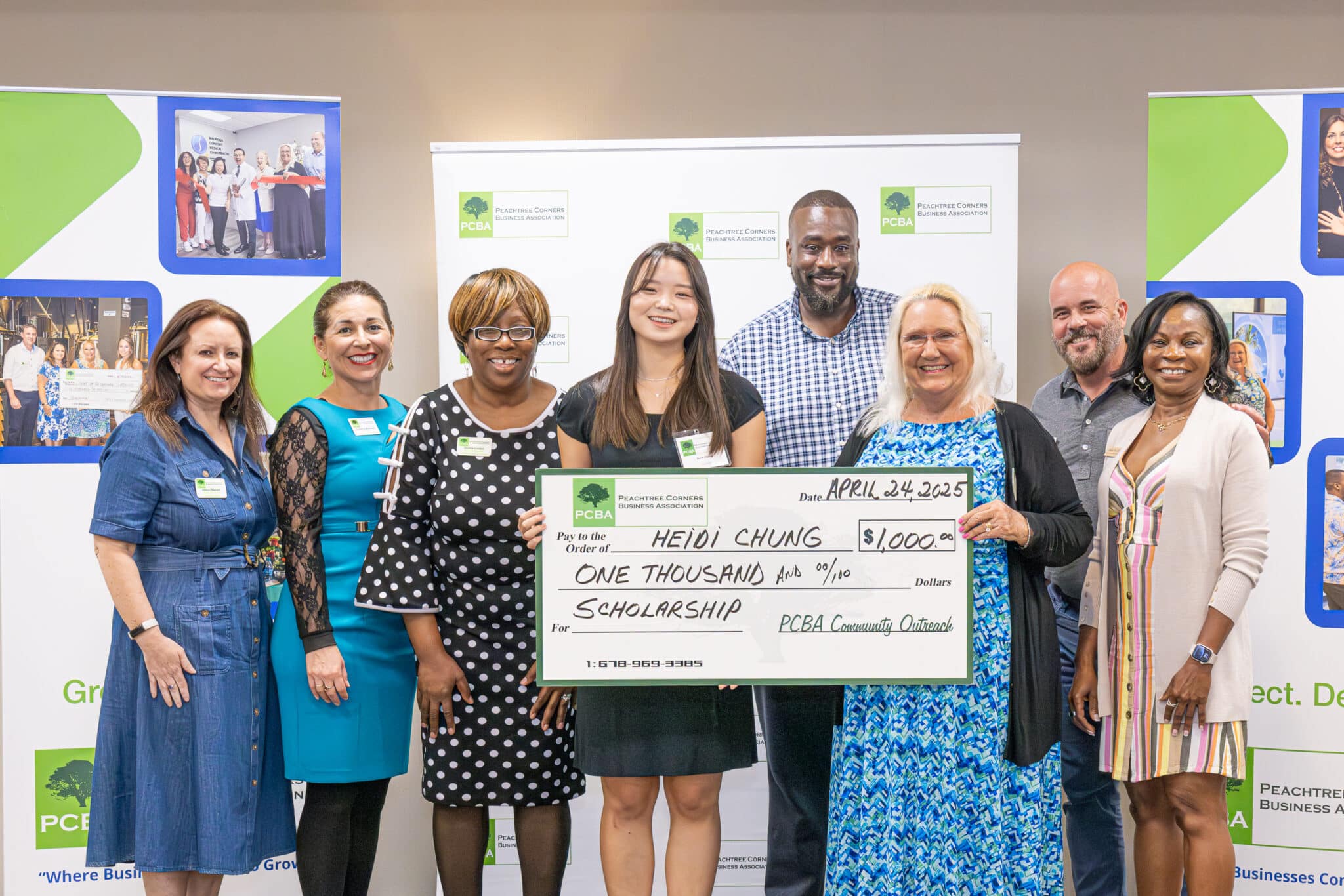
The Peachtree Corners Business Association (PCBA) awarded local high school senior, Heidi Chung, a $1,000 scholarship during their April 24 Business After Hours event. Heidi and her family were presented with the scholarship and introduced to the organization’s members and guests at the monthly gathering.
Heidi was accepted by several colleges and has selected the University of Kentucky to continue her education, pursuing a degree in nursing. When asked what lessons she has learned from her experiences volunteering and serving in the community throughout her life, Heidi commented, “I have learned that true leadership is about service, taking initiative and persevering through challenges.”
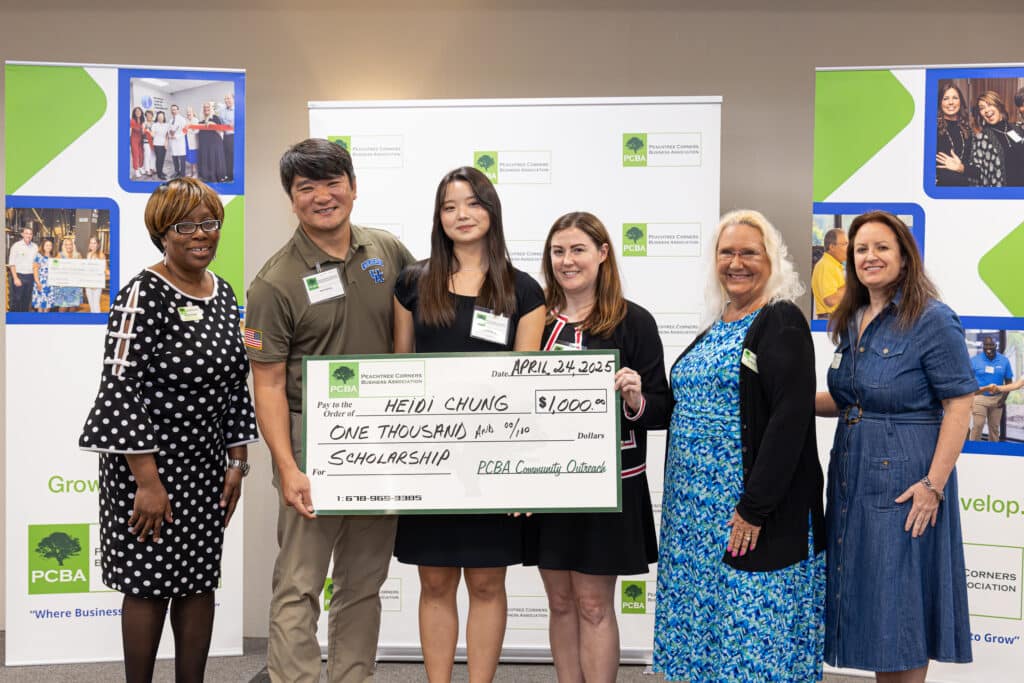
Scholarship Chair Donna Linden and Outreach Director Suzanna Martinez shared that the scholarship committee was impressed with Heidi’s many accomplishments, “whether she was organizing fundraisers, leading performance groups or helping athletes recover from injuries, Heidi demonstrated a positive impact on the community, as well as outstanding academic results.”
Funds for the PCBA Community Outreach Program are raised throughout the year from PCBA membership, sponsorship and an annual charity event. Donations and scholarships are awarded at PCBA’s monthly events so that members have the opportunity to learn more about the individuals and organizations.
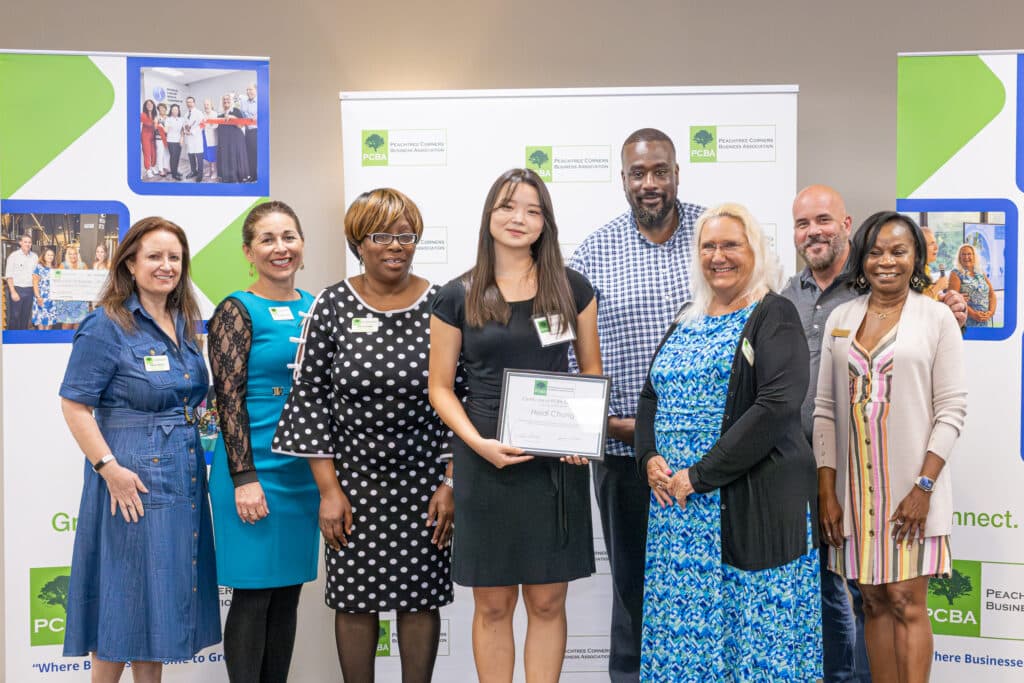
“We are so proud that the PCBA has … awarded 20 scholarships to outstanding future business leaders and donated in excess of $173,000 into our metro Atlanta community over the last 13 years,” stated Lisa Proctor, PCBA board president.
About Peachtree Corners Business Association
“Where Businesses Come to Grow,” the Peachtree Corners Business Association is a business membership organization that focuses on innovative approaches, programs, shared resources, community outreach and opportunities for member businesses and professionals to connect, develop, grow and prosper.
The PCBA is made up of businesses of all sizes and types who want to expand their reach and grow their business within Peachtree Corners and the greater metro Atlanta area.
For more information, call 678-969-3385, email membership@peachtreecornersba.com or visit peachtreecornersba.com.
Related
Read the Digital Edition
Subscribe
Keep Up With Peachtree Corners News
Join our mailing list to receive the latest news and updates from our team.
You have Successfully Subscribed!

GA Tech Launches First-of-its-Kind GT Atrium in Peachtree Corners

Katherine Lafourcade — A Journey of Passion, Resilience and Giving Back

Digital Edition

PCBA Announces 2025 Scholarship Winner

Paul Duke STEM High School Student Earns CGO Scholarship

World Blood Donor Day Starts Here: Theo’s Miracle, Katherine’s Mission [Podcast]

Executive Function: A Tribute to Working Moms

Peachtree Corners Grows Business Opportunities Through Economic Development

Simpson Elementary Marks Exceptional Children’s Week

Executive Function: A Tribute to Working Moms

Official City Merchandise Line Debuts This Saturday at Town Green

Peachtree Corners Grows Business Opportunities Through Economic Development

Digital Edition

World Blood Donor Day Starts Here: Theo’s Miracle, Katherine’s Mission [Podcast]

Paul Duke STEM High School Student Earns CGO Scholarship

PCBA Announces 2025 Scholarship Winner

Light up the Corners [Video]

Capitalist Sage: Business Leadership in Your Community [Podcast]

Cliff Bramble: A Culinary Adventure through Italy

Top 10 Brunch Places in Gwinnett County

A Hunger for Hospitality

THE CORNERS EPISODE 3 – BLAXICAN PART 1

Top 10 Indoor Things To Do This Winter

The ED Hour: What it takes to Remove Barriers from Education

Peachtree Corners Life
Topics and Categories
Trending
-
Digital Edition4 days ago
Digital Edition
-
Podcast4 days ago
World Blood Donor Day Starts Here: Theo’s Miracle, Katherine’s Mission [Podcast]
-
Community2 days ago
Executive Function: A Tribute to Working Moms
-
Business3 days ago
Peachtree Corners Grows Business Opportunities Through Economic Development







